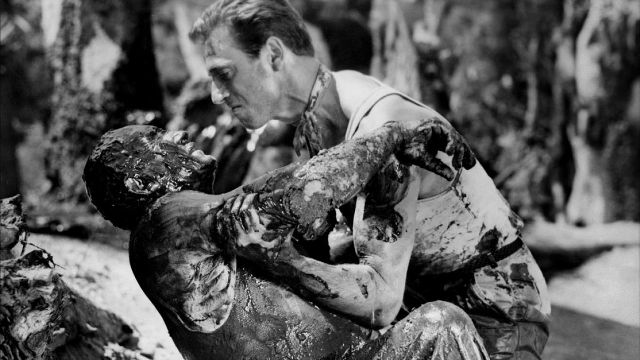The Wages of Fear (1953) 
“”TREMENDOUS! BRILLIANT! SUPREME! “…N. Y. Times”

Director: Henri-Georges Clouzot
Cast: Yves Montand, Charles Vanel, Peter van Eyck
Synopsis: In a decrepit South American village, men are hired to transport an urgent nitroglycerine shipment without the equipment that would make it safe.
The aimless existence of the jobless ex-pats in the decrepit little village of La Piedras in Wages of Fear (original title: La salaire de la peur) is perhaps intended as a metaphor for the quietly desperate lives of those who drift from day to day with no discernible aim or ambition. There’s a representative of all the developed continents here. Unable to leave because of the village’s remote location and the prohibitive cost of a plane ticket, these loafers, whose presence is never explained but who may have all at one time or another been employed by a major US oil company which has a plant nearby, earn ‘just enough to eat and drink,’ and laze their days away in the local saloon.
Director Henri-Georges Clouzot, who would follow this blistering action thriller a couple of years later with the equally impressive Les diaboliques, takes his time introducing us to the movie’s main characters, and the first part of Wages of Fear feels a little slow as a result. Nevertheless, this apparently shapeless construction mirrors the lives of Mario (Yves Montand), Jo (Charles Vanel), Bimba (Peter van Eyck) and Luigi (Folco Lulli) and is important in order to provide an insight into just why these men would be so keen to take on what appears to be a suicidal mission.
Attention focuses primarily on Mario, a young and virile man who doesn’t really seem to belong in the decrepit village. But, as he explains to the recently arrived Jo, La Piedras is like a prison — easy to get into, but nearly impossible to escape from. He sees in Jo, a middle-ranking gangster from Paris, a possible means of escape and is impressed by the way the older man faces down Luigi and the other men during an incident in the saloon.
An unexpected opportunity to escape the village arrives when one of the oil company’s towers catches fire. They need a consignment of highly unstable nitro-glycerine that they can ignite to create a big enough draft to snuff out the flames. But the site of the fire is 300 miles away, over rocky terrain. The company offers $2,000 each to four men to drive the volatile liquid there, cynically exploiting the fact that they’re represented by no union and have no family. They are, in effect, supremely dispensable.
Once the trip gets underway, the film changes from a slow, deliberate character study to a taut adventure thriller, although Clouzot’s script still manages to incorporate an examination of the way the men handle the extreme stress, in particular Jo, whose nerve quickly begins to fail him. Jo knows how to deal with people — they’re predictable and controllable — but when faced with a volatile, unreasoning force of nature that constantly threatens immediate immolation, he goes to pieces. By contrast, Mario, who was scared when a tense confrontation between Jo and Luigi threatened to become violent, is now the strong one, a transference of power which Jo tartly summarises by observing that Mario lacks the imagination he possesses.
The men’s rugged journey is punctuated by four hazardous incidents that are each heavy with tension. The first involves a stretch of uneven road over which the two trucks must travel at over 30mph in order to prevent the vibrations from detonating their cargo. Next, they must negotiate a narrow hairpin bend which requires them to reverse their trucks over a rotting platform jutting out over a steep incline. Then they have to use some of the nitro-glycerine to explode a boulder in the road. Finally, they must negotiate a lake of viscous oil created by a ruptured oil pipe. Clouzot gets close to the action during these moments, focusing on hands, speedometers, and tyres to enhance even further the extreme suspense inherent in each situation.
The drama is played out in bright, searing sunshine, but the tone is dark, the heat hellish. Clouzot seems to be suggesting that, one way or another, all four of these men are doomed, and that even if they survive the journey their lives will not be significantly improved. As this isn’t a Hollywood movie, and happy endings aren’t necessarily guaranteed, the success of the mission is always in question, and it’s fair to say that the film’s ending — although forced and unconvincing — remains true to the overall tone of the movie.
The Wages of Fear is a bona-fide classic that should be required viewing for anyone who considers themselves to have a serious interest in film.
(Reviewed 13th February 2013)
httpv://www.youtube.com/watch?v=OAYCADJHImc
